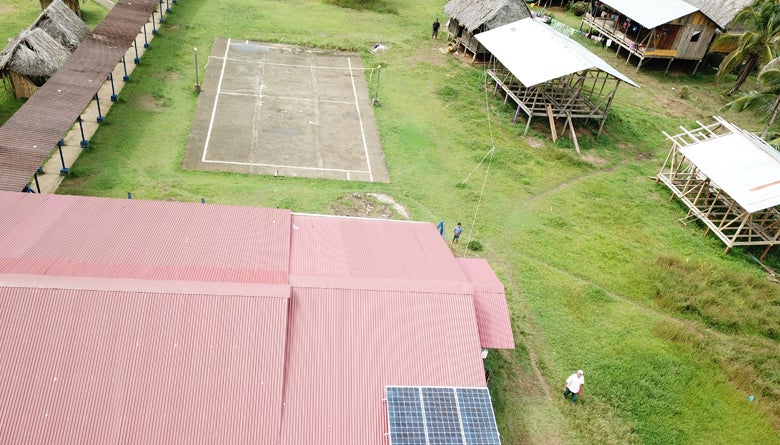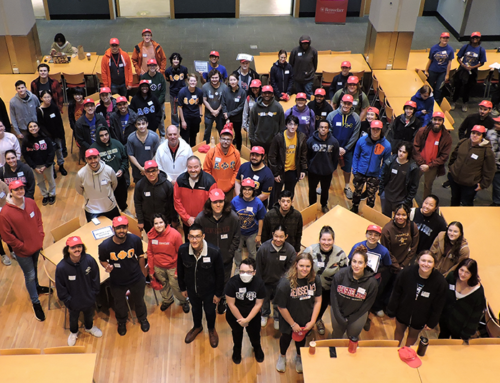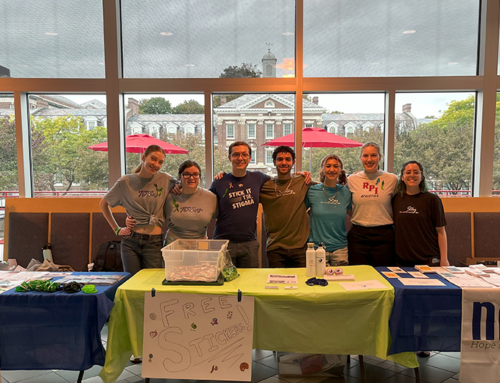The small community of Sandubidi, on the island of Isla Popa in Panama, is more than 2,000 miles from Rensselaer Polytechnic Institute in Troy, New York. It takes planes, boats, and trucks to get there. Rensselaer students recently flew to Panama, and then loaded solar panels onto a truck and a boat, making the journey as part of a continuous effort to solve some of the world’s greatest challenges.
A bird’s-eye view of Sandubidi highlights the area’s wealth of natural resources. Plentiful trees, fish-filled waters, and warm sunrays can be harnessed to build a sustainable life in the remote and rural community. The Rensselaer chapter of Engineers Without Borders, a national nonprofit organization that strives to build a better world through engineering, was founded in 2010. For nearly a decade, Rensselaer students involved in the program have been working on sustainability solutions with the Sandubidi community that utilize the island’s natural resources.
“They lack grid for electricity. They don’t have plumbing or any sort of water access like that,” said Louis Catalano, an engineering student and professional liaison for the Rensselaer chapter of Engineers Without Borders.
Over the recent winter break, Catalano and other Rensselaer students installed solar panels on the roof of a school in the village. The group hopes to return next January to install more panels.
“We plan on expanding that system to the church they have in the small village, which is what I would consider the second most important place for them to have energy as it’s kind of their gathering place,” said Andres Almeida, an engineering student and the project lead for the Panama project. “The way this has improved their lives is quite evident.”
During the day, the solar panels can now power fans, creating a healthier and more comfortable setting for children to learn. At night, community meetings that happen at the school will no longer be conducted in the dark.
The solar project is the second phase of the team’s mission in Panama. Previously, Rensselaer engineering students installed a water system to provide the community with clean drinking water.
“The biggest impact that we’ve had on the community is sustainability. One thing that we noticed when we installed our water project was other people started replicating the system for their own houses. This is something that we want to see with the solar project as well. If people see the value in these sustainable systems, they can copy it and use it for themselves and hopefully have a sustainable system for the entire community,” Catalano said.
The Rensselaer chapter of Engineers Without Borders is also working on a water distribution project in Nicaragua and on a community garden project in Troy.
Shreya Gupta is also a Rensselaer engineering student and president of the Rensselaer chapter. One of the most meaningful experiences from her work in Nicaragua was interacting with the children, especially the next generation of female leaders.
“It was crazy to see all of these younger women actually come in and want to do what we do. There were so many questions about engineering that came up, and these younger children understood that it doesn’t matter if you’re a male or a female, you can basically do whatever you want,” Gupta said.
The work has been transformative for Gupta and her fellow classmates, preparing them technically and intellectually to change the world, fulfilling the Rensselaer vision of the New Polytechnic in the process.
“My experience here at RPI, as well as my experience with Engineers Without Borders, has essentially laid the groundwork for my engineering field and career,” Catalano said.
“It has truly made me understand how much we take things for granted and the actual value of things like water, and food, and shelter,” Gupta said. “It’s really always humbling and always interesting to come back here and just have a new appreciation for things.”
“I feel like continuing to do work like this, it may not seem like big work, but it will definitely impact people’s lives,” Almeida said.




